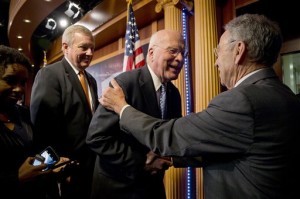
A bipartisan group of U.S. Senators, including Utah’s own Senator Mike Lee, have recently introduced a comprehensive justice reform bill that many are praising as landmark.
The legislation aims at recalibrating prison sentencing for certain drug offenders. The bill targets violent criminals, grants judges greater discretion in sentences for lower-level drug crimes, and attempts to help convicts successfully re-enter society and avoid re-offending.
The Sentencing Reform and Corrections Act of 2015 is led by Senate Judiciary Committee Chairman Chuck Grassley and Assistant Democratic Leader Dick Durbin and is sponsored by Senators John Cornyn (R-Texas), Sheldon Whitehouse (D-R.I.), Mike Lee (R-Utah), Charles Schumer (D-N.Y.), Lindsey Graham (R-S.C.), Patrick Leahy (D-Vt.) and Cory Booker (D-N.J.).
“This historic reform bill addresses legitimate over-incarceration concerns while targeting violent criminals and masterminds in the drug trade,” Grassley said at the introduction of the bill. “It’s the product of thoughtful bipartisan deliberation and I thank my colleagues for their hard work to promote opportunities to reduce recidivism while protecting our communities from violent career criminals.”
The bill narrows the scope of mandatory minimum prison sentences to focus on the most serious drug offenders and violent criminals. The bill also broadens and establishes new outlets for individuals with minimal non-felony criminal histories that may trigger mandatory minimum sentences under the current law.
“The United States incarcerates more of its citizens than any other country on earth,” Durbin said. “Mandatory minimum sentences were once seen as a strong deterrent. In reality they have too often been unfair, fiscally irresponsible and a threat to public safety. Given tight budgets and overcrowded prison cells, our country must reform these outdated and ineffective laws that have cost American taxpayers billions of dollars.”
The bill also reduces certain mandatory minimums, providing judges with greater discretion when determining appropriate sentences while preserving cooperation incentives that aid law enforcement in tracking down kingpins.
“Since my time as a federal prosecutor, I have been concerned that federal sentencing laws too often require punishments that just don’t fit the crime,” Lee said at the bill’s introduction. “These laws require many nonviolent offenders to spend years in prison, often with few opportunities for meaningful reform. Today’s legislation addresses both of these problems by reducing mandatory minimums and by expanding opportunities for programs that have been proven to reduce recidivism.”
The bill also makes retroactive the Fair Sentencing Act and other certain statutory reforms that address inequities in drug sentences.
President Obama, who has attempted to make criminal justice reform a big part of his legacy, has said that he wants a bill, much like this one, on his desk to sign by the end of the year.
The senators acknowledged that this bill is far from what each one of them would like, but given its bipartisan nature, they believe it to be a step in the right direction.
“For decades, our broken criminal justice system has held our nation back from realizing its full potential,” Booker said. “Today, we take a step forward … the Sentencing Reform and Corrections Act is a promising, bipartisan step forward to help right this wrong.”




